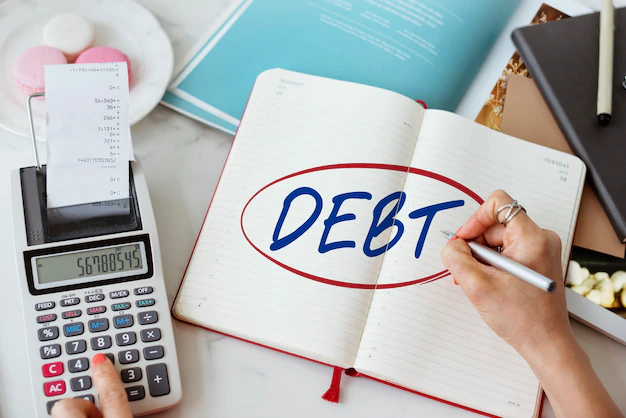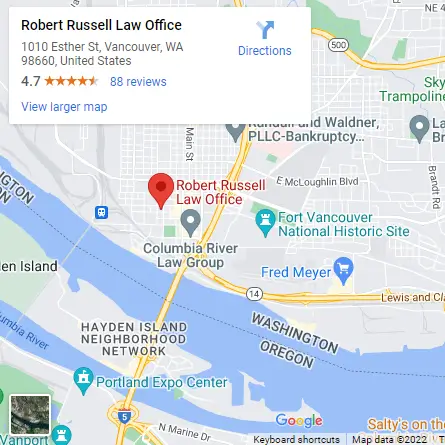The COVID-19 pandemic has put a lot of Americans into financial hardship. Filing for bankruptcy in Washington can help eliminate debt and give you a fresh start. Bankruptcy protection is one of the rights enjoyed by Americans that help with their financial problems. If you’re considering filing bankruptcy, consult our Vancouver bankruptcy attorneys for free!
Our experienced Vancouver attorneys are here to help you! We can help you understand the bankruptcy process and guide you through it all. Call our law office today to schedule your free consultation!
Bankruptcy Terms
Let’s go over the basic legalese of bankruptcy cases, so you know the language necessary to talk about it.
Bankruptcy discharge
When debt gets discharged, you are released from personal liability and are not required to pay for them anymore. Note that not all debts incurred are dischargeable.
Automatic Stay
When you file for bankruptcy, an automatic stay is placed by the bankruptcy court. This means that collection agencies are prohibited from making any collection efforts.
Means Test
The way you qualify for bankruptcy is through the bankruptcy means test, which measures your debt and income. The outcome will determine which chapter you’ll need to file to discharge debt
Bankruptcy Overview
To know which type of bankruptcy is best for you, we provide a summary of the relevant chapters of the Bankruptcy Code.
Chapter 7
Chapter 7 is also known as liquidation bankruptcy. Here, a trustee takes a debtor’s nonexempt property and sells them for the benefit of creditors. Your unsecured debts are then discharged after bankruptcy.
Chapter 13
Chapter 13 bankruptcy is a reorganization bankruptcy. You submit a repayment plan to the court that spans 3-5 years, outlining how you plan to repay the debt per month. The debt remaining after the bankruptcy period may be discharged. People generally file under this chapter if they don’t fit the income requirements of Chapter 7 or if they want to save their property from foreclosure or repossession.
If you’re unsure which among the types of bankruptcy is right for you, it’s best to talk to a Vancouver bankruptcy attorney. A bankruptcy expert will look at your case to see which bankruptcy chapter fits your circumstances, or whether there is a bankruptcy alternative! Call our bankruptcy law firm today!
Bankruptcy Process
1. Discuss your case with our skilled attorneys
Knowledge is power. First, you need to know the pertinent information regarding your case. Our office offers a free initial consultation for new bankruptcy clients!
Once you’ve scheduled an appointment with us, we can talk about everything you need to know about declaring bankruptcy. We’ll ensure you have all the bankruptcy information you need to make an informed decision before proceeding with the next step.
2. Collect your financial documents
After the free bankruptcy consultation, we will provide you with a list of all the financial documentation you need for your filing. You can also find the list on our website’s page on bankruptcy forms. Once you have everything, you can submit the documents so we can start on your case!
3. Finish the debtor education course
Before you can proceed to file for bankruptcy, you need to complete this course. This briefing outlines credit counseling opportunities and helps you make a budget analysis within 180 days before the filing of your case.
4. Review your final bankruptcy petition with our skilled attorneys
Once we receive the paperwork, we will finish the first draft of your petition as soon as we can. Once that’s done, we will need an appointment to review your petition and for us to explain all the forms to you.
Once everything is done, you’ll have to sign the petition so we can file it with the Bankruptcy Court.
5. Attend the meeting of creditors hearing
Once the petition is filed in court, a trustee is appointed to your case. For a Chapter 13 case, It is their responsibility to assist in the sale of your assets that are not protected by bankruptcy rules, if any, and to distribute the payment to your creditors.
This brief meeting, like with all bankruptcy cases, normally takes place 4-6 weeks after you’ve filed for bankruptcy. In this meeting, your creditors and the trustee will have the opportunity to ask questions. Questions range from information such as your income or certain items in your petition.
There is one more hearing that must be attended when filing for Chapter 13 bankruptcy. It is known as the Hearing on Confirmation, and it will take place after the Meeting of Creditors. At this hearing, your trustee will make recommendations to the judge on whether the payment plan you submit is sufficient and meets the requirements of the bankruptcy code. The presiding judge will then either notify us that revisions must be made or grant final approval to the repayment arrangement.
6. Complete a financial management course after your petition
Before your debts can get discharged, you must first complete a Financial Management Course. This can help the debtor recognize and correct the financial problems that led them to declare bankruptcy.
If you’re in a financially precarious situation, bankruptcy help can relieve you of your stresses and give you a fresh start. Call our trusted Vancouver bankruptcy lawyers today to discuss your bankruptcy options
Bankruptcy Exemptions
If you’re going through bankruptcy, you’d want to know if you can keep your property. Depending on the chapter, you might not have to give up any at all due to bankruptcy exemptions!
You have a choice between the federal bankruptcy exemptions and the Washington exemptions list. Go through this with your bankruptcy attorney to see which of your possessions you can save. Spouses who both have an ownership interest in the property can file bankruptcy together to double the exemption amount.
As mentioned above, your nonexempt property will be sold in Chapter 7 to pay off each creditor you have under the bankruptcy court.
With a Chapter 13 bankruptcy, it’s possible to save all your property if you include them in your repayment plan.
Washington’s Bankruptcy Exemption List
Here are a few of the common bankruptcy exemptions when you file bankruptcy in Washington:
Washington Wildcard Exemption
A debtor may exempt any type of personal property (except wages) up to $10,000 given the following limitations:
- No more than $2,000 for bank accounts
Washington Motor Vehicle Exemption
A debtor can exempt a motor vehicle with up to $15,000 in equity. Spouses who jointly file bankruptcy can each protect a vehicle.
Washington Homestead Exemption
A debtor in Clark County can exempt up to about $540,000 equity in their home.
Washington Debtor Education Information and Credit Counseling
People who file for bankruptcy are required to take two financial courses: one before the bankruptcy filing, and one more before obtaining a discharge.
Get in Touch with our Experienced Vancouver Bankruptcy Lawyer Today!
Bankruptcy is one of the options Americans have for obtaining debt relief. With the right chapter, bankruptcy doesn’t have to be such a difficult ordeal that leaves you worse off. Talk to an experienced bankruptcy lawyer who’s well-versed in bankruptcy laws and proceedings to get you on the right track to a secure financial future.
Robert Russell is a long-time practicing lawyer in the area of bankruptcy. Robert Russell serves each client with compassion, understanding, and patience. Call us now for a free initial consultation!
We care about you and we’re very good at what we do. We hope to see you soon. (See More Testimonials.)



